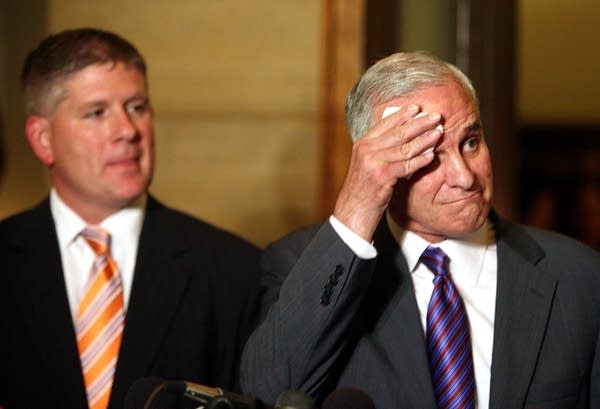Leaders now tasked with writing, passing budget

With Minnesota's government impasse close to over, Gov. Mark Dayton and GOP legislative leaders are now tasked with writing budget bills and passing them in a special legislative session.
Neither side is entirely happy with the deal, but both the governor and Republican leaders said say they have enough to get government restarted.
After meeting privately for three hours Thursday, Dayton and GOP legislative leaders emerged from the governor's office to announce a deal had been brokered.
Dayton, GOP House Speaker Kurt Zellers and GOP Senate Majority Leader Amy Koch looked tired and glum as they approached the microphones. Dayton informed reporters that the budget deal, which spends $35.4 billion over the next two years, will soon end a shutdown that has now entered its third week.
Create a More Connected Minnesota
MPR News is your trusted resource for the news you need. With your support, MPR News brings accessible, courageous journalism and authentic conversation to everyone - free of paywalls and barriers. Your gift makes a difference.
The deal came after Dayton announced he would reluctantly agree to drop his push for a tax increase and accept a GOP offer from June 30. He said the budget won't rely on permanent revenue but will prevent spending cuts he wanted to avoid.
"My priority is to get Minnesota back to work and do so in a way that protects critical services and this accomplishes that," Dayton said.
The deal relies on two large portions of one-time money that would add about $1.4 billion to the budget. One portion would come from shifting state payments to schools to the next fiscal year. The other portion would be borrowed against future payments from tobacco companies as part of the settlement the state reached more than a decade ago.
Dayton put three conditions on the agreement: Republicans must drop social policy changes from their bills, drop their plan to cut 15 percent of the state's workforce and pass a bonding bill of at least $500 million to fund public works construction projects.
Koch acknowledged many people would be critical of the plan's dependence on one-time money to support ongoing spending.
"We share those concerns," Koch said. "This is an agreement that is, I think, difficult for both sides."
The plan gives each side a political victory and partisans fodder for criticism. Dayton dropped his push for an income tax hike on Minnesota's top earners — something many Democrats said was needed to fix the budget. Republicans had to swallow more than the $34 billion limit they promised to spend.
GOP leaders said they will deliver the votes to pass the budget. DFL House Minority Leader Paul Thissen suggested there would be little support from his side of the aisle.
"This is the Republican's budget offer. It's a Republican plan. They should accept it," Thissen said. "They're the majority and they should be able to pass their own budget."
Thissen declined to say whether this budget plan would help or hurt his party's chances in 2012. Republican Rep. Mary Franson of Alexandria feels her party won the political battle because the deal doesn't include any tax hikes.
"The fact that we are able to walk away without a tax increase is very huge. The nation is watching Minnesota," Franson said. "We've got issues on the federal level. Had we caved into a tax increase it would have sent a message to the entire United States."
But Franson said she is unsure she will vote for the final budget. She has supported holding the line on spending and is also concerned about borrowing against future tobacco payments and the K-12 funding delay.
Other Republicans also are taking a wait-and-see approach.
"I'm optimistic with reservations. That's the best way to say it. I'm not going to say whether I'm going to support or oppose it at this point," said Rep. Glenn Gruenhagen, R-Glencoe. "I need additional information and that will be forthcoming in the next few days."
Other Republicans seem inclined to support the deal.
Rep. Tim Sanders, R-Blaine, said it isn't perfect, but it will end a shutdown that has put 22,000 state employees out of work.
"Deals don't get better. You end up having to take choices that weren't necessarily your first choice in this point in the game," Sanders said. "If we can get agreement and it puts back to work and opens up the state again, it's something I'm open to seriously considering to support."
Dayton said he'd like to call lawmakers back into special session, and expects to pass legislation and end the shutdown "within days."
